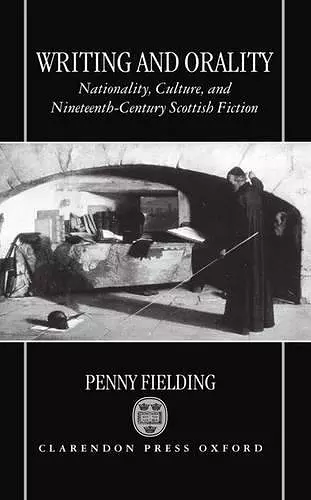Writing and Orality
Nationality, Culture, and Nineteenth-Century Scottish Fiction
Format:Hardback
Publisher:Oxford University Press
Published:6th Jun '96
Currently unavailable, and unfortunately no date known when it will be back

This book explores the concepts of nationality and culture in the context of nineteenth-century Scottish fiction, through the writing of Walter Scott, James Hogg, R. L. Stevenson, and Margaret Oliphant. It describes the relationship between speech writing as a foundation of the literary construction of a particular national identity, exploring how orality and literacy are figured in nineteenth-century preoccupations with the definition of `culture'. It further examines the importance of romance revival in the ascendancy of the novel and the development of that genre across a century which saw the novel stripped of its female associations and accorded a masculine authority, touching on the sexualization of language in the discourse between women's narrative (oral) and men's narrative (written). The books importance for literary studies lies in the investigation of some of the consequences of deconstruction. It explores how the speech/writing opposition is open to the influence of social and material forces. Focusing on the writing of Scott, Hogg, Stevenson, and Oliphant, it looks at the conflicts in narratological experiments in Scottish writing, constructions of class and gender, the effects of popular literacy and the material condition of books as artefacts and commodities. This book is the first to offer a broad picture of the interaction of Scottish fiction and modern theoretical thinking, taking its roots from a combination of deconstruction, narrative theory, the history of orality, linguistics and psychoanalysis.
Penny Fielding's Writing and Orality is a highly stimulating and accomplished contribution to work in this field, and to the study of nineteenth-century Scottish fiction. Succinctly written and lucidly developed, its range is broad - as the title suggests - but its details are finely rendered and its interpretations acute ... both theoretically and historically informed, often with an impressive grasp of detail and an eye for the unusual text ... It will be required reading for anyone interested in nineteenth-century Scottish literature and in more general questions about literature's engagement with its spoken other. * Fiona Robertson, Studies in Hogg and his World, Number 7, 1996 *
This is a complex psychological terrain, and it is an additional virtue of Penny Fielding's subtle and entertaining approach that she keeps several strands of argument in play while maintaining a judicious balance between their competing claims on attention. In her specific readings, the intricate weave of orality with literacy produces insights that traverse the public and private, from literary character to the character of culture. * Colin Nicholson, University of Edinburgh, MLR, vol 93, no 3, 1998 *
a very thoughtful study ... persuasive, copious of detail, and not reductive ... Often brilliant in its textual analysis, and always clearly and effectively written, it is a welcome addition to studies in this area. * Ian Dennis, Victorian Studies, Summer 1997 *
This is a book that seeks to challenge the fundamental speech/writing opposition of Western culture by demonstrating the ways in which morality functions. * Times Literary Supplement *
wide-ranging study of the concept-function of orality in nineteenth-century Scottish literary culture * Ina Ferris, Scottish Literary Journal, Supp 45 (Winter '96) *
This is a very good book which adds greatly to our understanding of the relationship between written and oral forms, and their mutual, though often uncomfortable dependence on each other. At the same time it provides an original and highly informative account of one of the themes which gave shape to the development of the Scottish nineteenth-century novel. Finally, and not least of all, Writing and Orality is often as entertaining as the stories it discusses and a constant pleasure to read. * Anthony Lake, Romanticism *
This is a highly accomplished study ... Her wide-ranging chapters surveying the currents of orality and literature in the nineteenth century contain some of the best material in the book, though they are surpassed by the analyses of Oliphant's short stories. Fielding deserves particular credit for her theoretically aware appreciation of Oliphant's important late work ... This is Fielding's first book and an impressive debut. Few critics have written so well about the authorial power of Stevenson and Oliphant, and no one has written so well about speech and textuality in their work. I hope Fielding's next book will be even more ambitious in scope, and that it will come soon. * Robert Crawford, University of St Andrews, Modern Philology *
ISBN: 9780198121800
Dimensions: 224mm x 146mm x 20mm
Weight: 481g
264 pages